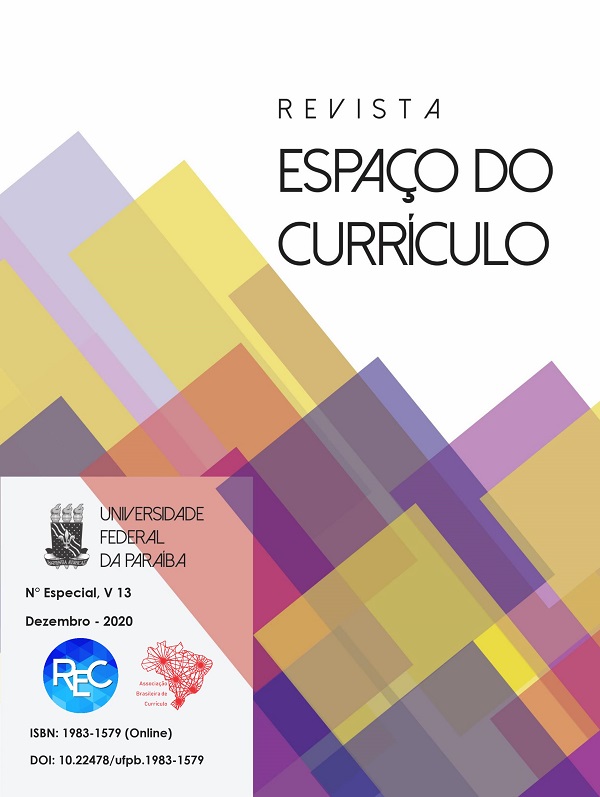CURRICULAR FISSURES IN THE TEACHING PROFESSION
pedagogical narratives in/with diversity
DOI:
https://doi.org/10.22478/ufpb.1983-1579.2020v13nEspecial.54550Keywords:
Teaching profession, Curricular fissures, Diversity, Narratives of Pedagogical ExperiencesAbstract
This article aims to discuss curricular fissures produced by teachers of Basic Education in relation to diversity. From an epistemopolitical perspective that is inclined to listen to the teachers' wasted experiences (SANTOS, 2011), we seek to analyze the field of curricular dispute constructed from narratives of pedagogical experiences. It is a qualitative research, with a narrative approach, developed with professors of Technical Professional Education on two campuses of the Federal Institute of Bahia. The study was developed from collaborative analysis of pedagogical letters written, rewritten, read, commented and edited pedagogically among the teachers involved. The result points to curricular fissures that are translated into a field of dispute of existentialities that are repositioning teachers in the authorship of another knowledge policy. Among the fissures presented, teachers point to cultural conflict and student protagonism as mobilizing disruptions in colonial curricular practices. In addition, they highlighted the knowledge policy established in the production of teaching authorship, which repositioned the geopolitics of knowledge produced in/with the daily life of the teaching profession, as a possibility to shift the curriculum to an insurgent perspective.
Downloads
Metrics
References
CARVALHO, José Jorge. Encontro de saberes e descolonização: para uma refundação étnica, racial e epistêmica das universidades brasileiras. In: BERNADINO-COSTA, Joaze; MALDONATO-TORRES, Nelson; GROSFOGUEL,Ramón. Decolonialidade e pensaento afrodiásporico. 2ª ed. Belo Horizonte: Autêntica editora, 2019, p.79-106.
FLEURI, Reinaldo Matias. Educação Intercultural e movimentos sociais – Trajetórias de pesquisa da Rede Mover. João Pessoa: Editora do CCTA, 2017.
GOMES, Nilma Lino. Relações étnico-raciais, educação e descolonização dos currículos. In: Currículo sem Fronteiras, v.12, n.1, Jan/Abr 2012. p. 98-109.
MALDONATO-TORRES, Nelson. Analítica da colonialidade e da decolonialidade: algumas dimensões básicas. In: BERNADINO-COSTA, Joaze; MALDONATO-TORRES, Nelson; GROSFOGUEL,Ramón. Decolonialidade e pensaento afrodiásporico. 2ª ed. Belo Horizonte: Autêntica editora, 2019, p.27-54.
RIPAMONTI, Paula. Investigar através de narrativas – Notas epistémico-metodológicas. In: DE OTO, Alejandro et al. Metodologías en contexto: intervenciones en perspectiva feminista, poscolonial, latinoamericana. Buenos Aires: CLACSO, 2017. p.83-104.
SANTOS, Boaventura de Sousa, Para além do pensamento abissal: das linhas globais a uma ecologia de saberes, Novos estud. – CEBRAP n. 79 São Paulo nov. 2007
SANTOS, Boaventura de Sousa. A crítica da razão indolente – Contra o desperdício da experiência. v. 1. 8. ed. 2. reimp. São Paulo: Cortez, 2011.
SANTOS, Boaventura de Sousa. A gramática do tempo para uma nova cultura política. V.4. 3ª ed. São Paulo: Cortez, 2010
SANTOS, Boaventura de Sousa. Para uma pedagogia do conflito. In: SILVA, Luis Eron da. (Org.). Reestruturação curricular: novos mapas culturais, novas perspectivas educacionais. Porto Alegre: Sulina, 1996. p. 15-33.
SILVA, Tomaz Tadeu da. Documentos de Identidade: uma introdução às teorias do currículo. Belo Horizonte: Autêntica, 1999.
SUÁREZ, Daniel Hugo. Escribir, leer y conversar entre docentes en torno de relatos de experiencia, 2016. Disponível em: <https://drive.google.com/file /d/0B56Bh1CBhwLCY19 OUDNxQldiczY2dlpZa 2FXendsbWdmbUEw/view?usp=sharing>. Acesso em: 10 jun. 2018.
SUÁREZ, Daniel Hugo. Documentación narrativa e investigación-formación-acción em educación. In: SOUZA, Elizeu Clementino de. (Org.). (Auto)biografias e documentação narrativa: redes de pesquisa e formação. Salvador: EDUFBA, 2015. p. 63-86.
SUÁREZ, Daniel Hugo; ARGNANI. Agustina. Nuevas formas de organización colectiva y producción de saber pedagógico: la red de formación docente y narrativas pedagógicas. Revista da FAEEBA – Educação e Contemporaneidade, Salvador, v. 20, n. 36, p. 43-56, jul./dez. 2011.
SUÁREZ, Daniel Hugo. Dispersión curricular, descalificación docente y medición de lo obvio. Los efectos pedagógicos de la reforma educativa de los ‘90. Novedades Educativas, n. 155, p. 44-49, 2003.
TUBINO, Fidel. La interculturalidad em cuestión. Lima: Pontificia Universidad Católica del Perú, Fondo Editorial, 2016a.
TUBINO, Fidel. Los sentidos del interculturalismo latinoamericano y la utopía dialógica. Cuyo. Anuário de Filosofía Argentina y Americana, v. 33, p. 69-77, 2016b.
WALSH, Catherine. Notas pedagógicas a partir das brechas decoloniais In: CANDAU, Vera. (Org.). Interculturalizar, descolonizar, democratizar: uma educação “outra”? Rio de Janeiro: 7Letras, 2016. p. 64-75.
WALSH, Catherine. Pedagogías decoloniales: Prácticas insurgentes de resistir, (re)existir y (re)vivir. TOMO I. Série Pensamento Decolonial. Ediciones Abya-Yala, Quito-Ecuador, noviembre 2013, p. 23-68.
Downloads
Published
How to Cite
Issue
Section
License
Copyright (c) 2020 Curriculum Space Journal

This work is licensed under a Creative Commons Attribution 4.0 International License.
By submitting an article to Curriculum Space Journal (CSJ) and having it approved, the authors agree to assign, without remuneration, the following rights to Curriculum Space Journal: first publication rights and permission for CSJ to redistribute this article. article and its metadata to the indexing and reference services that its editors deem appropriate.
















